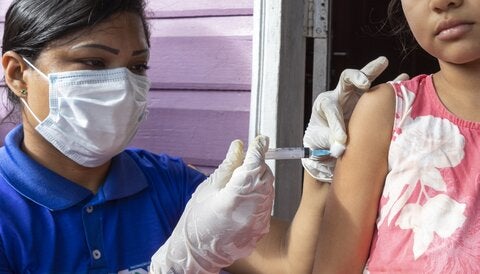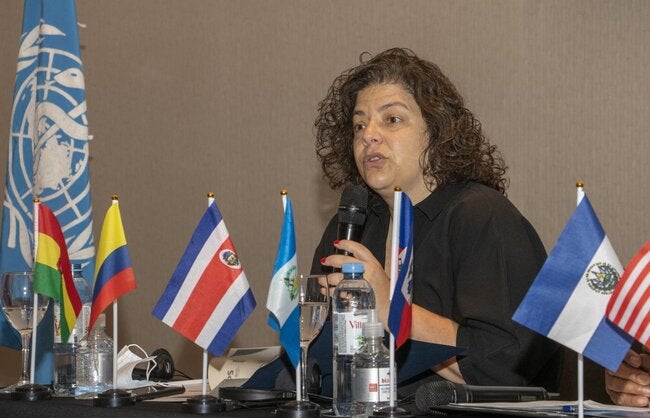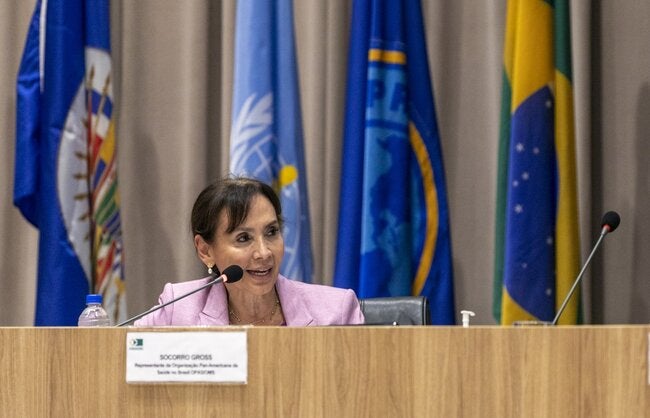Through the Revolving Fund, 41 countries have access to safe and quality vaccines that are 75% cheaper than if they were to purchase them on their own. In a region that pioneered the elimination of diseases such as smallpox, polio and measles, the Fund plays a role that goes far beyond the purchase of vaccines.
The process looks simple. Natalia Vélez arrives with her 7-year-old daughter Luciana at a vaccination center in the municipality of Sogamoso, in the west-central part of the department of Boyacá in Colombia. Luciana is nervous but her mother reassures her. When her turn comes, they are called, and the nurse makes a joke to get a smile out of her. As he takes the vaccine and fills the syringe with the liquid, he explains what he is about to do. Finally, he gives Luciana the shot that prevents the girl from having a disease that could be serious but thanks to immunization is now under control.
Behind the almost routine act of vaccinating Luciana is a complex system that allows millions of doses to reach the arms of people in 41 countries that access vaccines through the Revolving Fund of the Pan American Health Organization (PAHO). This is a mechanism that allows countries to purchase safe and quality vaccines at a better price than if they were to buy them on their own. In this way, PAHO promotes equity that ensures better health outcomes for all.
This agency, which began operating in 1979 as a financial mechanism and pooled capital fund, in 2022 purchased more than 400 million vaccines, syringes and other supplies for immunization and advised dozens of countries on various issues related to vaccination in South America, the Caribbean, Central America and North America.
“I strongly believe in vaccination. I think it’s very important nowadays, because it’s a way to prevent many diseases,” said Natalia, who accompanied her daughter to get all the doses she was due and is now waiting to give her the vaccine against human papillomavirus (HPV), an infection that affects her very closely after the death of a friend from cervical cancer caused by HPV.
Thanks to a system of equitable access to vaccines such as the Revolving Fund (RF), the Americas are a pioneer region in the elimination of vaccine-preventable diseases such as smallpox, polio, and measles.
"The Revolving Fund has been a major driver of immunization in the Americas region. In its 43 years of operation, it not only grew its vaccine purchases and contributed to the introduction of new products, but also played a key role in providing advice and guidance to countries on how to implement their immunization plans," said Santiago Cornejo, executive director of PAHO's Special Program for Regional Revolving Funds.
Why do Countries Purchase Vaccines Through the Fund?
“The Revolving Fund is a crucial tool in the procurement of vaccines for Latin America and the Caribbean,” noted Argentina’s Minister of Health, Carla Vizzotti. “The approach and strategy of the Revolving Fund is very important. These are quality vaccines, prequalified by the World Health Organization, and there is also a very significant aspect, which is the lowest price,” added the Minister.
The economy of scale allows small countries to purchase vaccines that would be more expensive if they were bought independently. By doing it together with the entire Pan-American system, a lot of money is saved.
According to data processed by the Revolving Fund, taking as a reference the 13 most commonly used routine vaccines in the region, countries would have paid 75% more on their vaccine purchases between 2018 and 2022 if they had done so outside the Fund.
In addition, the RF not only facilitates procurement, but also provides technical cooperation to countries to strengthen their immunization systems. “Beyond a large-scale and competitive purchasing mechanism, the Fund has a health and solidarity-based approach,” added Vizzotti.
Why is this System Said to Promote Equity?
The Fund has been key to improving vaccination coverage in the Americas because it allows all countries, regardless of their size, to pay the same for each dose. For small countries, for instance, it would be difficult to afford many of the vaccines they purchase today through the Fund. “We have a single price for all countries, that is, it doesn’t matter if a country buys 500 or 1,000,000 doses. The price is the same,” Oscar Vargas, Revolving Fund Specialist, said.
For Vizzotti, it is important that large countries continue to buy through the Fund because this ensures that they all keep lowering prices even in their own national bidding processes. “The most important thing is to sustain the virtuous circle of solidarity that we achieve by having a larger scale. We have more bargaining power to continue lowering prices,” said Vizzotti.
Equity is achieved not only because of the presence of large countries ensuring volume, but also because the RF regulations allow countries to purchase vaccines for the entire target population through their national programs and at the same price for all, explained Socorro Gross, PAHO’s representative in Brazil, with almost 30 years in the organization. “There is no distinction whereby those who have money will have vaccines and those who don’t, won’t,” she added. And this also brings about equity within the large countries, because “90% of the region’s poor people live in middle- and high-income countries” and not only in the poor and small countries.
According to Gross, the Fund is not only an example of solidarity, but also of integration and contributes to the “chaining of products” from the region for the region, since there are vaccines produced in Latin America that reach the rest of the countries through the RF. For example, vaccines for yellow fever or influenza are manufactured in Brazil. This, in her opinion, is something that promotes countries’ independence and sovereignty because the region is less dependent on other producing countries outside the Americas.
How Does the Financing PAHO Offers to Countries Work?
Countries that purchase vaccines through the Fund have access to interest-free financing for 60 days after receiving the doses. How does the Revolving Fundraise the money to make this financing possible? For each dose sold through the system, countries pay an additional 4.25%. A portion of that money, 2.5% of each dose, goes into a capital fund that countries can use for that line of credit for vaccines. The remaining 1.75% is used to pay for the Fund’s administrative costs. But the benefits are not just financial or economic. The Fund also provides advice and product quality assurance to countries.
The Revolving Fund also provides cooperation in the areas of market analysis and demand planning, logistics advice, procurement processes, strategic communication, and technical support on matters such as cold chains, quality and prequalification of vaccines.
How is Quality Ensured?
In order to enter the bidding process, suppliers must submit two proposals: a technical and a financial proposal. “First, a technical and quality assessment is carried out, and if passed (by the supplier), it can be considered for a contract award,” Vargas explained. Vaccines must be prequalified by WHO and meet established technical quality requirements.
“The Revolving Fund ensures that what the country is buying and making available to the entire population is of the required quality,” Gross said.
What are the Bidding Processes Like?
PAHO’s Revolving Fund conducts open and international bidding processes among the manufacturers of the vaccines it procures for the countries. PAHO then decides to purchase the offer with the best price, although in many cases, in order not to be tied to a single supplier, it enters into agreements with more than one manufacturer, Vargas explained.
How is Transparency Ensured?
By having a bid opening attended by all manufacturers that submitted bids, Vargas explained. Once the process is completed, the manufacturers that were not awarded the contract are notified that they were not considered. The countries do not participate in this process because they hand over the responsibility to PAHO.
Another distinctive element of the Revolving Fund which contributes to transparency is that the prices settled in these negotiations are published on the PAHO website.
The Revolving Fund faces several challenges, including obtaining low and sustainable prices for vaccines, diversifying sources of supply, and preparing for future pandemics. It must also protect itself from “a part of the industry that sees the Revolving Fund as a constraint to their profitability,” according to Gross, because “they cannot enter the Americas region, as they have entered other regions of the world, to implement differential pricing per capita, which would be terrible.” To achieve this, communication and public support are important, according to the representative.
Another aspect suggested by Argentine Minister Carla Vizzotti is to work on simplifying vaccination schedules. “It is important to reduce the number of shots in order to avoid having many appointments which, in turn, may reduce adherence," she said. To that end, it is necessary to work with laboratories to achieve more single-dose immunizations.
One of the strengths of the RF in purchasing vaccines for 41 countries is that it can send stronger signals to the industry about the needs of national immunization programs, Cornejo explained. One of those needs, according to Vizzoti, is to try to secure more single-dose immunizations.
Making it simpler can help maintain the high vaccination standards that have established the Americas as a leading vaccination region. But if measures are not taken to simplify processes and at the same time address misinformation, the Minister says, these advances could be at risk because by making diseases disappear, the younger generations do not perceive the risk of not being vaccinated. Thus, for Vizzotti, to a certain extent, “vaccines are a victim of their own success.”






